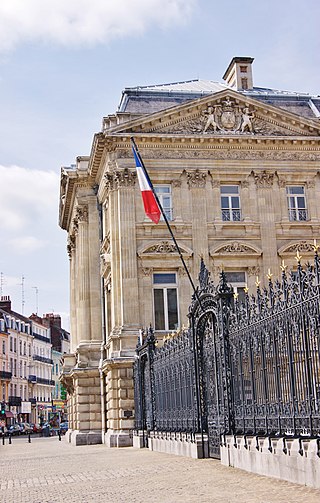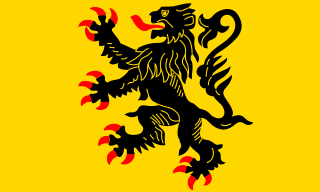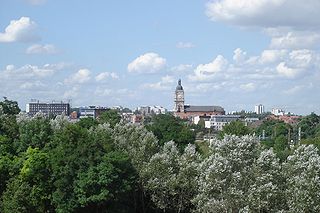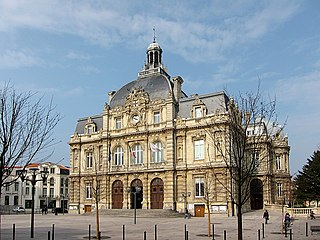Related Research Articles

Nord is a département in Hauts-de-France region, France bordering Belgium. It was created from the western halves of the historical counties of Flanders and Hainaut, and the Bishopric of Cambrai. The modern coat of arms was inherited from the County of Flanders.

Nord-Pas-de-Calais ; Picard: Nord-Pas-Calés; West Flemish: Nôord-Nauw van Kales); is a former administrative region of France. Since 1 January 2016, it has been part of the new region Hauts-de-France. It consisted of the departments of Nord and Pas-de-Calais. Nord-Pas-de-Calais borders the English Channel (west), the North Sea (northwest), Belgium and Picardy (south). Until the 17th century, the history of the North was largely in common with the history of Belgium, that of a land that "for almost a thousand years served as a battlefield for all of Europe." The majority of the region was once part of the historical Southern Netherlands, but gradually became part of France between 1477 and 1678, particularly during the reign of king Louis XIV. The historical French provinces that preceded Nord-Pas-de-Calais are Artois, French Flanders, French Hainaut and (partially) Picardy. These provincial designations are still frequently used by the inhabitants. The former administrative region was created in 1956 under the name "Nord" and maintained that name until 1972 when "Pas-de-Calais" was added. This remained unchanged until its dissolution in 2016.

Lille is a city in the northern part of France, within French Flanders. Positioned along the Deûle river, near France's border with Belgium, it is the capital of the Hauts-de-France region, the prefecture of the Nord department, and the main city of the European Metropolis of Lille.

Lens is a city in the Pas-de-Calais department in northern France. It is one of the main towns of Hauts-de-France along with Lille, Valenciennes, Amiens, Roubaix, Tourcoing, Arras and Douai. The inhabitants are called Lensois.

Roubaix is a city in northern France, located in the Lille metropolitan area on the Belgian border. It is a historically mono-industrial commune in the Nord department, which grew rapidly in the 19th century from its textile industries, with most of the same characteristic features as those of English and American boom towns. This former new town has faced many challenges linked to deindustrialisation such as urban decay, with their related economic and social implications, since its major industries fell into decline by the middle of the 1970s. Located to the northeast of Lille, adjacent to Tourcoing, Roubaix is the chef-lieu of two cantons and the third largest city in the French region of Hauts-de-France ranked by population with nearly 99,000 inhabitants.

Tourcoing is a city in northern France on the Belgian border. It is designated municipally as a commune within the department of Nord. Located to the north-northeast of Lille, adjacent to Roubaix, Tourcoing is the chef-lieu of two cantons and the fourth largest city in the French region of Hauts-de-France ranked by population with about 97,000 inhabitants.

The Métropole Européenne de Lille is the métropole, an intercommunal structure, composed by a network of big cities whose major city is the city of Lille. It is located in the Nord department, in the Hauts-de-France region, northern France – bordering both the Flemish and Walloon regions of Belgium. It was created in January 2015, replacing the previous Communauté urbaine de Lille, and covers that part of the Lille metropolitan area that lies in France. Its area is 671.9 km2. Its population was 1,179,050 in 2019, of which 234,475 in Lille proper. The annual budget of the métropole is €1,865 billion (2018).
Edward Klabiński was a professional racing cyclist from Poland. He was the first cyclist from Poland to take part in the Tour de France. He finished in 34th place at the 1947 Tour de France. He also rode in the 1948 Tour de France where he finished 2nd on two stages, and placed 18th overall. Klabiński won the first edition of the Critérium du Dauphiné Libéré.

This Summary and map of the 2005 French riots is to clearly show the spread of the 2005 French riots.

The arrondissement of Lille is an arrondissement of France in the Nord department in the Hauts-de-France region. It has 124 communes. Its population is 1,260,060 (2021), and its area is 879.5 km2 (339.6 sq mi).

Lille-Flandres station is the main railway station of Lille, capital of French Flanders. It is a terminus for SNCF Intercity and regional trains. It opened in 1842 as the Gare de Lille, but was renamed in 1993 when Lille Europe station opened. There is a 500 metres (1,600 ft) walking distance between the two stations, which are also adjacent stops on one of the lines of the Lille Metro.
The University of Lille Doctoral College, formerly the European Doctoral College Lille Nord-de-France, is part of the University of Lille since the dissolution of the Community of Universities and Institutions Lille Nord de France in 2019.

The German occupation of north-east France refers to the period in which French territory, mostly along the border with Belgium and Luxembourg, was under military occupation by the German Empire during World War I.

Hauts-de-France is the northernmost region of France, created by the territorial reform of French regions in 2014, from a merger of Nord-Pas-de-Calais and Picardy. Its prefecture is Lille. The new region came into existence on 1 January 2016, after regional elections in December 2015. The Conseil d'État approved Hauts-de-France as the name of the region on 28 September 2016, effective the following 30 September.
The following is a timeline of the history of the city of Roubaix, France.

Yves Marie-Édouard Devernay was a 20th-century French organist, improviser and composer.

Furet du Nord is a chain of bookstores in the Nord department of France. Its origins date back to 1936 when a fur store located on Rue de la Vieille-Comédie in Lille was transformed into a bookstore. It retained its name, referring to a local tradition: rabbit hunting with ferrets.
Mahjoub Ben Bella was an Algerian-born French painter and designer. He is well known for his murals and cobblestone designs for Paris–Roubaix.

The Departmental Council of Nord is the deliberative assembly of the French department of the Nord, the most populous French department. The headquarters of this decentralized local authority are in Lille.